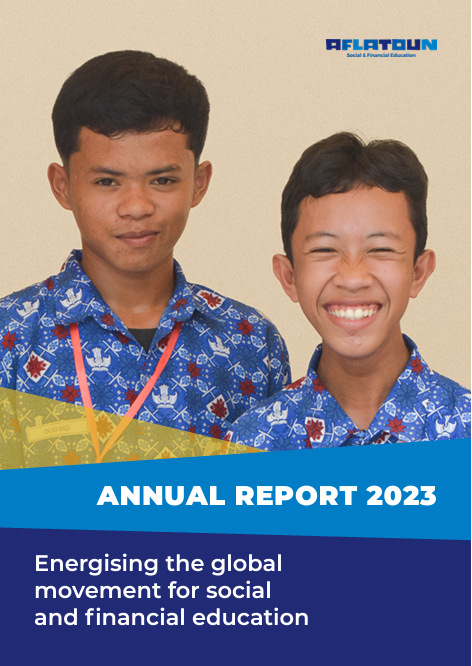Aflatoun International works with a network of trainers to effectively deliver life skills and financial education to children all over the world. Among those trainers are the Global Master Trainers, which train educators Aflatoun’s methodology in their own home countries. These Global Master Trainers ensure the quality of the programme and in fact, play a big role in delivering Aflatoun’s curricula.
Monica is our Global Master Trainer from Mexico, and is the director of our partner organisation Observa. She speaks to us about how the Aflatoun programme has been addressing violence against women in Mexico and the impact it is having on communities there.
Can you tell us a little bit about yourself and your background?
I have been working with Aflatoun for 5 years in different cities in Mexico, through my organisation Observa, where I am the director. We have been using the programme for 5 years in different schools (formal education).
Observa works directly with the schools and contacts the teachers and directors; however, it is not implemented at the government level as yet. The teachers receive the Aflatoun training from Observa and then teachers use the programme with children

How does working with Aflatoun impact you personally and professionally?
I have been working in the field for 18 years, first with the victims of war in Colombia through aid from international cooperation. Peace is also a very important subject in Mexico at this moment, because of the history of violence. Observa has a specific manual of “peace culture” and it is a good match with the Aflatoun programme because of the thematic content, the methodology, and that it is easy to scale up. It was difficult to find a programme that worked with peace culture and that’s why we picked the Aflatoun programme because it was easy to adapt and it complements our programme.
Can you share an impact stories, one that has touched or inspired you?
The students are able to do a lot of activities in the clubs and develop ‘peace culture’ activities focused on femicide ( violence against women). Mexico ranks no 1 in femicide rates in the world and the clubs focus on activities to protect the girls from violence against women. This has been the biggest impact. Aflateen helps the girls and boys (teenagers) become aware of these problems and how to report behaviour, crimes and prevention.
We also work with homeless shelters for children and it had a big impact on the children and the team because they learned a lot about the management of both monetary and non-monetary resources.
The impact that we have seen has started with the teachers, as the teachers are at first hesitant of the activities and the programme because they don’t know what to expect. But once they start understanding the logic behind it this changes their attitude. At the end of the training, many of them express how valuable the sessions were. In Mexico it is up to the teachers to implement or not implement the Aflatoun programme and we know that they keep using the programme even after years. It is even more meaningful because it is not a mandatory course and they are doing it as an option.

Why do you think social and financial education is important for young people?
Through the programme they can develop skills to transition to the workforce and also to generate income and help the community. In the Mexican context the transition to the workforce is complex and they don’t have many options so this provides them the necessary skills.
Is there a link between Social and Financial Education and violence against women?
I have seen that many problems begin with money and this leads to bad decisions and mistakes. It is important to have a balance for how to use money both for the individual and for the community. Femicide is not just a problem here but all over the world and the programme helps students better understand and the teachers in how to address the problem through different activities.
Developing a methodology and approach for teachers to educate children and young girls about these problems is crucial and we see teachers struggling to do so. So through the Aflatoun programme we have been able to successfully address this. This is doubly important as the teachers themselves may be victims of violence or know people who are.
Some examples where the programme has helped, is between faculty relations (men and women) and also young boys who get aggressive with female teachers. We also see that it has improved relations with the families and the teachers in rural areas. Sometimes the families don’t want the teachers to instruct the students on these matters. However, the students have been working with their families and talking about these issues, which has improved the relationship within the family and outside with the school as well.











